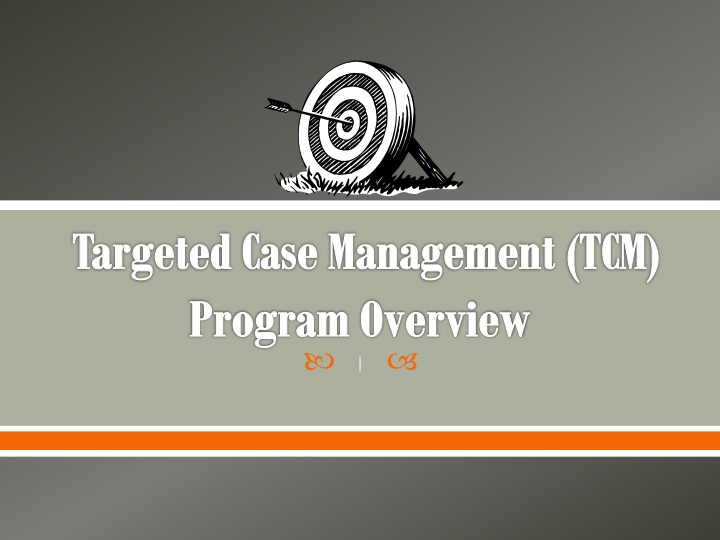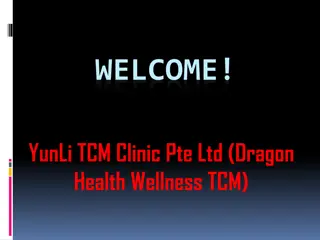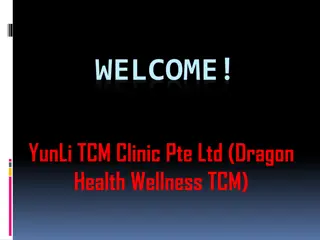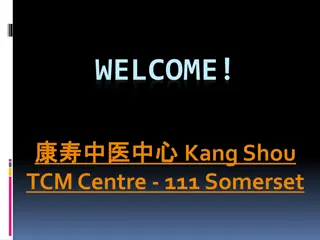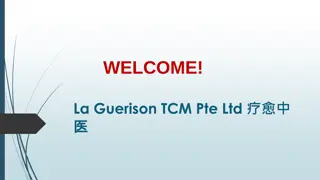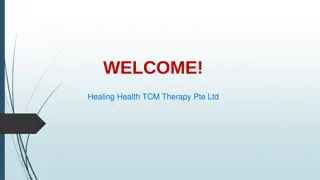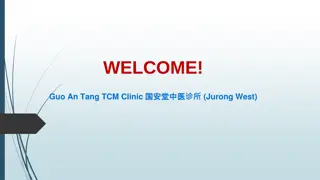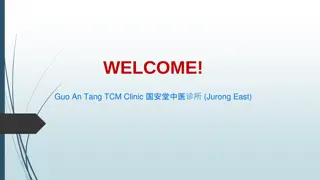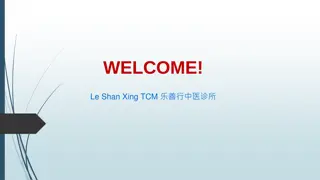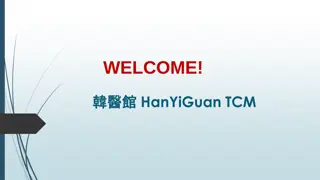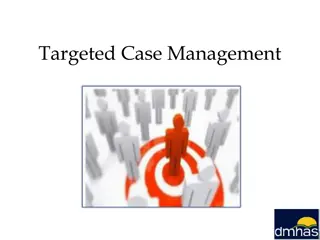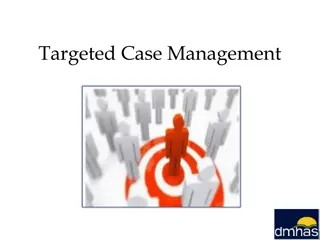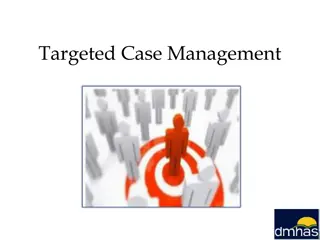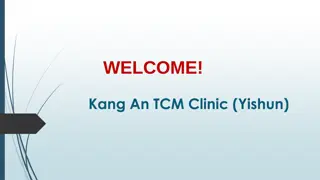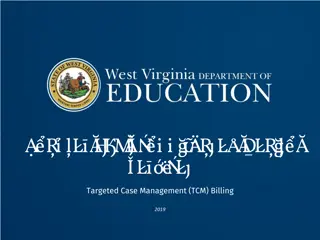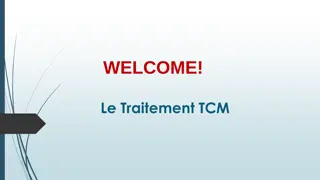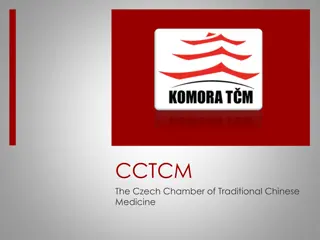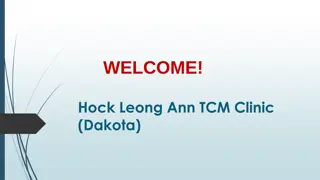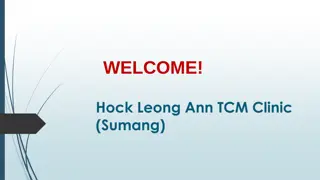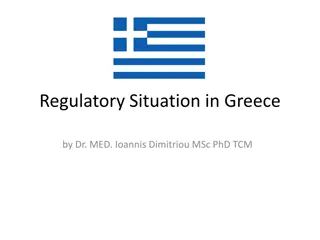Overview of Targeted Case Management (TCM) Program
The Targeted Case Management (TCM) Program, governed by Welfare and Institutions Code 14132.44, provides essential services to Medi-Cal eligible individuals within specific target groups. TCM offers comprehensive case management services to address the medical, social, educational, and other needs of individuals while ensuring flexibility and choice in service options. The program follows Title 42 of the Code of Federal Regulations, Section 440.169, outlining key components such as assessments, care planning, referrals, and monitoring. TCM conducts regular assessments to evaluate individual needs, preferences, and any changes that may occur over time, aiming to provide tailored support and assistance efficiently.
Uploaded on Sep 19, 2024 | 0 Views
Download Presentation

Please find below an Image/Link to download the presentation.
The content on the website is provided AS IS for your information and personal use only. It may not be sold, licensed, or shared on other websites without obtaining consent from the author.If you encounter any issues during the download, it is possible that the publisher has removed the file from their server.
You are allowed to download the files provided on this website for personal or commercial use, subject to the condition that they are used lawfully. All files are the property of their respective owners.
The content on the website is provided AS IS for your information and personal use only. It may not be sold, licensed, or shared on other websites without obtaining consent from the author.
E N D
Presentation Transcript
Targeted Case Management (TCM) Program Overview 1
TCM Program Overview The TCM program is governed by the Welfare and Institutions Code 14132.44 . . . case management services that assist Medi-Cal eligible individuals within a specified target group gain access to needed medical, social, educational and other services. Case management services ensure that the changing needs of the Medi-Cal eligible person are addressed on an ongoing basis and appropriate choices are provided among the widest array of options for meeting those needs. 2
TCM Program Overview2 According to Title 42 of the Code of Federal Regulations, Section 440.169 (d), TCM case management services are comprehensive and each encounter must include at least one or more of the following four service components: oComprehensive Assessment and Periodic Reassessment oDevelopment of a Specific Care Plan oReferral and Related Activities oMonitoring and Follow Up Activities 3
TCM Program Overview3 Comprehensive Assessment and Periodic Comprehensive Assessment and Periodic Reassessment: Reassessment: o TCM provides a comprehensive assessment and periodic reassessment of individual needs, to determine the need for any medical, educational, social or other services. These assessment activities include: o Taking client history o Identifying the individual s needs and completing related documentation 4
TCM Program Overview4 Comprehensive Assessment and Periodic Reassessment Comprehensive Assessment and Periodic Reassessment (Continued): (Continued): o Gathering information from other sources such as family members, medical providers, social workers, and educators (if necessary), to form a complete assessment of the eligible individual o Assessment and periodic reassessment is to be conducted at a minimum of once every six months to determine if an individual s needs, conditions, and/or preferences have changed 5
TCM Program Overview5 Comprehensive Assessment and Periodic Comprehensive Assessment and Periodic Reassessment Reassessment - - Example: Example: o A case manager, during a face-to-face encounter with a client, notices the need for adequate food in the home. 6
TCM Program Overview6 Development of a Specific Care Plan: Development of a Specific Care Plan: A specific care plan is developed by the case manager based on the information collected through the assessment that: o Specifies the goals and actions to address the medical, social, educational, and other services needed by the individual 7
TCM Program Overview7 Development of a Specific Care Plan (Continued): Development of a Specific Care Plan (Continued): o Includes activities such as ensuring the active participation of the eligible individual, and working with the individual (or the individual s authorized health care decision maker) and others to develop those goals o Identifies a course of action to respond to the assessed needs of the eligible individual 8
TCM Program Overview8 Development of a Specific Care Plan Development of a Specific Care Plan - - Example: o A Case manager develops a care plan during a face-to-face encounter and plans to refer client to a food bank for a weekly grocery bag and also refers the client for daily free lunches at a church. Example: 9
TCM Program Overview9 Referral and Related Activities: Referral and Related Activities: TCM provides referral and related activities to help the eligible individual obtain needed services including: o Activities that help link the individual with medical, social, educational providers, or other programs and services that are capable of providing needed services to address identified needs and achieve goals specified in the care plan. 10
TCM Program Overview10 Referral and Related Activities Referral and Related Activities - - Example: Case manager during a face-to-face visit calls the food bank and makes arrangements for the client to pick up a bag of groceries for this week and gives information and directions to a church for daily free lunches for the client to utilize. Example: o 11
TCM Program Overview11 Monitoring and Follow Up Activities: Monitoring and Follow Up Activities: Monitoring and follow-up activities/contacts are necessary to adequately address the eligible individual s needs, and may be done with the individual, family members, service providers, or other entities or individuals and may be conducted as frequently as necessary. 12
TCM Program Overview12 Monitoring and Follow Up Activities (Continued): Monitoring and Follow Up Activities (Continued): They include at least one annual monitoring to determine whether the following conditions are met: o Services are being furnished in accordance with the individual s care plan o Services in the care plan are adequate o Changes in the needs of status of the individual are reflected in the care plan o Monitoring and follow-up activities include making necessary adjustments in the care plan and service arrangements with providers 13
TCM Program Overview13 Monitoring and Follow Up Activities (Continued): Monitoring and Follow Up Activities (Continued): o Periodic reviews must be completed at least every six months. These activities may be conducted as specified in the care plan, or as frequently as necessary to ensure execution of the care plan o Monitoring does not include ongoing evaluation or check-in of an individual when all care plan goals have been met 14
TCM Program Overview14 Monitoring and Follow Up Activities Monitoring and Follow Up Activities - - Example: o In regards to the client going to get the free lunches from a church, the client says she went but will not go again because she did not feel comfortable. The case manager plans to research for other possible resources for free meals. Example: 15
TCM Program Overview15 The five distinct TCM target populations a The five distinct TCM target populations as: o Children Under the Age of 21 (14) o Medically Fragile Individuals (15) o Individuals at Risk of Institutionalization (16) o Individuals in Jeopardy of Negative Medical or Psycho-Social Outcomes (17) o Individuals with a Communicable Disease (18) s: 16
TCM Program Overview16 Children Under the Age of 21 (14): Children Under the Age of 21 (14): Medi-Cal-eligible children, under the age of 21 years old, who are: At risk for medical compromise due to one of the following conditions: o Failure to take advantage of necessary health care services, or o Non-compliance with their prescribed medical regime, or 17
TCM Program Overview17 Children Under the Age of 21 (14) (Continued): Children Under the Age of 21 (14) (Continued): o An inability to coordinate multiple medical, social and other services due to the existence of an unstable medical condition in need of stabilization, or o An inability to understand medical directions because of comprehension barriers, or o A lack of community support system to assist in appropriate follow-up care at home, or o Substance abuse, or o A victim of abuse, neglect or violence; and In need of assistance in accessing necessary medical, social, educational, or other services, when comprehensive case management is not being provided elsewhere. 18
TCM Program Overview18 Medically Fragile Individuals (15): Medically Fragile Individuals (15): Medi-Cal-eligible 18 years or older, who are medically fragile, and have multiple diagnoses. Such individuals must also be: o At risk for medical compromise due to one of the following conditions: Failure to take advantage of necessary health care services, or Non-compliance with their prescribed medical regime, or 19
TCM Program Overview19 Medically Fragile Individuals (15) (Continued): Medically Fragile Individuals (15) (Continued): An inability to coordinate multiple medical, social and other services due to the existence of an unstable medical condition in need of stabilization, or An inability to understand medical directions because of comprehension barriers, or A lack of community support system to assist in appropriate follow-up care at home, or Substance abuse, or A victim of abuse, neglect or violence; and In need of assistance in accessing necessary medical, social, educational, or other services, when comprehensive case management is not being provided elsewhere. 20
TCM Program Overview20 Individuals at Risk of Institutionalization (16): Individuals at Risk of Institutionalization (16): Medi-Cal-eligible individuals, 18 years or older, are in frail health, and meet the following criteria: o Have been identified as needing assistance due to one of the following reasons: Are in need of assistance to access services in order to prevent medical institutionalization, or Exhibits an inability to independently handle personal, medical or other affairs, or Are transitioning to a community setting, who due to socioeconomic status, substance abuse, neglect or violence have failed to take advantage of necessary health care services; and 21
TCM Program Overview21 Individuals at Risk of Institutionalization (16) (Continued): Individuals at Risk of Institutionalization (16) (Continued): o At high risk for medical compromise due to one of the following conditions: Failure to take advantage of necessary health care services, or Non-compliance with their prescribed medical regime, or An inability to coordinate multiple medical, social and other services due to the existence of an unstable medical condition in need of stabilization, or An inability to understand medical directions because of comprehension barriers, or 22
TCM Program Overview22 Individuals at Risk of Institutionalization (16) (Continued): Individuals at Risk of Institutionalization (16) (Continued): A lack of community support system to assist in appropriate follow-up care at home, or Substance abuse, or A victim of abuse, neglect or violence; and o In need of assistance in accessing necessary medical, social, educational, or other services, when comprehensive case management is not being provided elsewhere. 23
TCM Program Overview23 Individuals in Jeopardy of Negative Health or Psycho Individuals in Jeopardy of Negative Health or Psycho- - Social Outcomes (17): Social Outcomes (17): Medi-Cal-eligible persons who have been determined to be in jeopardy of negative health or psycho-social outcomes due to one of the following disparity factors: o Substance abuse in the immediate environment, or o History of, or in danger of family violence, or o History of danger of physical, sexual or emotional abuse, or o Experiencing substandard housing, or o Illiteracy; and 24
TCM Program Overview24 Individuals in Jeopardy of Negative Health or Psycho Individuals in Jeopardy of Negative Health or Psycho- - Social Outcomes (17) (Continued): Social Outcomes (17) (Continued): Such individuals must be in need of assistance in accessing necessary medical, social, educational, or other services, when comprehensive case management is not being provided elsewhere. 25
TCM Program Overview25 Individuals with a Communicable Disease (18): Individuals with a Communicable Disease (18): Medi-Cal-eligible individuals infected with a communicable disease, including tuberculosis, HIV/AIDS, etc.: or individuals who have been exposed to communicable diseases, until the risk of exposure has passed. Such individuals must also be: o At risk for medical compromise due to one of the following conditions: Failure to take advantage of necessary health care services, or 26
TCM Program Overview26 Individuals with a Communicable Disease (18) Individuals with a Communicable Disease (18) (Continued): (Continued): Non-compliance with their prescribed medical regime, or An inability to coordinate multiple medical, social and other services due to the existence of an unstable medical condition in need of stabilization, or An inability to understand medical directions because of comprehension barriers, or A lack of community support system to assist in appropriate follow-up care at home, or Substance abuse, or A victim of abuse, neglect or violence; and 27
TCM Program Overview27 Individuals with a Communicable Disease (18) Individuals with a Communicable Disease (18) (Continued): (Continued): In need of assistance in accessing necessary medical, social, educational, or other services, when comprehensive case management is not being provided elsewhere. 28
TCM Program Overview28 TCM Encounter TCM Encounter: o An "encounter" is defined as a face-to-face contact or a telephone contact in lieu of a face-to-face contact when environmental considerations preclude a face-to-face encounter for the purpose of rendering one or more targeted case management service components by a case manager. 29
TCM Program Overview29 Record Retention Record Retention: o All records in support of allowable TCM services must be maintained for the greater of: (a) three fiscal years after the end of the quarter the LGA receives reimbursement from the DHCS for the expenditures incurred, or (b) three fiscal years after the date of submission of the original or amended TCM cost report, whichever is later, per W&I 14170 30
TCM Program Overview30 TCM Required Participation Documents TCM Required Participation Documents: o TCM Annual Participation Prerequisite July 1 o TCM Provider Participation Agreement Renewed Every Five Years Every Five Years o Annual TCM Cost Report November 1 At all times the following documents are required to be on site and available upon request: o TCM Time Survey Training and Documentation o Encounter logs o Client case file documentation July 1 Renewed November 1 31
TCM Program Overview31 Reimbursement of Costs: Reimbursement of Costs: o The costs of providing TCM services to Medi-Cal beneficiaries are reimbursed at the federal medical assistance percentage (FMAP), which is currently fifty percent. o Payment for TCM services must not be duplicated under any other program authorities for the same purposes. 32
TCM Program Overview32 TCM Program Resources TCM Program Resources: For more information refer to the sources below or contact your TCM Analyst by emailing the TCM unit at DHCS-TCM@DHCS.CA.GOV o California Code of Regulations o Code of Federal Regulations o TCM Website (www.dhcs.ca.gov/tcm) o California Welfare and Institutions Code W&I Code Section 14132.44 o Office of Management and Budgets OMB Circular A-87 33
